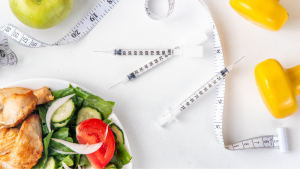Weight loss injections, such as GLP-1 receptor agonists like semaglutide and liraglutide, have become popular tools in the fight against obesity. These medications work by mimicking hormones that regulate appetite, helping individuals feel fuller and reduce calorie intake. However, for sustainable weight loss and overall health improvement, it’s essential to pair these injections with healthy lifestyle habits.
Nutrition: Fueling Your Body for Success on Weight Loss Injections
Choosing Nutrient-Dense Foods
While weight loss injections can suppress appetite, choosing nutrient-dense foods ensures your body receives essential vitamins and minerals. Opt for whole foods, lean proteins, and fiber-rich vegetables to maintain energy levels and support overall health. For instance, snacks like apple slices with nut butter or Greek yogurt with berries can provide satiety and nutrition.
Additionally, incorporating probiotic-rich foods like yogurt, kimchi, and sauerkraut can enhance gut health, which plays a role in weight management. Prebiotics, found in foods like garlic, onions, and bananas, support beneficial gut bacteria, further promoting digestive health and overall well-being.
Incorporating Healthy Fats and Carbohydrates
A balanced diet should include healthy fats, such as those found in avocados, nuts, and olive oil, which can help with satiety and brain function. Complex carbohydrates, like quinoa, brown rice, and sweet potatoes, are preferable to refined carbs because they provide sustained energy and prevent blood sugar spikes.
Pairing proteins with fiber-rich carbs slows digestion, preventing spikes in blood sugar and prolonging satiety. Meals balanced with protein, fiber, and healthy fats create stable energy levels, reducing cravings for unhealthy snacks.
Practicing Mindful Eating to Support Weight Loss Injections
Practicing mindful eating helps you become more attuned to your body’s hunger and fullness cues. By eating slowly and savoring each bite, you can prevent overeating and make more conscious food choices. Try keeping a food journal to track meals and identify patterns in your eating habits.
Mindful eating also involves reducing distractions, such as watching TV or scrolling on your phone, while eating. This can lead to better digestion and a stronger connection to your body’s satiety signals.

Exercise: Moving Towards a Healthier You
Strength Training and Muscle Preservation During Weight Loss
Regular physical activity complements the effects of weight loss injections by increasing calorie expenditure and improving cardiovascular health. Incorporate a mix of strength training and cardiovascular exercises to build muscle and boost metabolism.
Strength training not only burns calories but also helps prevent the loss of muscle mass, which can occur with weight loss. Lifting weights two to three times per week supports muscle maintenance and a higher resting metabolic rate.
Finding Enjoyable Physical Activities
Finding activities you enjoy, such as dancing, swimming, or hiking, can increase adherence to an exercise routine. Group fitness classes, personal training sessions, or workout apps can help maintain motivation. Find the best exercises for weight loss.
Outdoor activities, like hiking or cycling, can make exercise more enjoyable while also exposing you to natural sunlight, which boosts vitamin D levels and supports overall mood.
Creating a Sustainable Workout Routine
Consistency is key. Establish a realistic workout schedule that fits your lifestyle, aiming for at least 150 minutes of moderate-intensity exercise per week, as recommended by health guidelines.
Hydration & Sleep: The Often Overlooked Factors Support Weight Loss Injections
Staying Hydrated for Optimal Health
Adequate water intake supports digestion and can help control hunger, as thirst is sometimes mistaken for hunger. Carrying a water bottle and setting hydration reminders can aid in meeting daily water goals.
Drinking water before meals can help with portion control, as it promotes a sense of fullness. Herbal teas and flavored water with fresh fruits provide hydration alternatives without added sugars.
The Role of Sleep in Weight Management
Quality sleep is crucial for weight management. Lack of sleep can disrupt hormones that regulate hunger, leading to increased appetite and cravings for unhealthy foods. Aim for 7-9 hours of sleep per night and establish a calming bedtime routine to improve sleep quality.
Reducing caffeine intake in the afternoon and maintaining a consistent sleep schedule can significantly enhance sleep quality, supporting weight management efforts.
Mental Health & Emotional Well-Being While on Weight Loss Injections
Managing Emotional Eating
Emotional eating can hinder weight loss progress. Identifying triggers, such as stress or boredom, and developing alternative coping strategies, like engaging in hobbies or practicing relaxation techniques, can be beneficial.
Journaling, meditation, and engaging in creative activities like painting or music can provide stress relief and reduce emotional eating tendencies.
Seeking Professional Support
If emotional eating or stress-related behaviors become overwhelming, seeking professional help from a therapist or counselor can be beneficial. Cognitive-behavioral therapy (CBT) is an evidence-based approach that helps individuals manage emotional eating and build healthier relationships with food.
Conclusion
Combining weight loss injections with healthy habits creates a sustainable path to weight loss and improved well-being. Remember, these injections are tools to assist your journey, but lasting change comes from the consistent application of healthy lifestyle practices.
By integrating nutritious eating, regular physical activity, adequate hydration, sufficient sleep, and emotional well-being strategies, individuals can achieve and maintain their weight loss goals. Every small step counts, and persistence will lead to long-term success.



